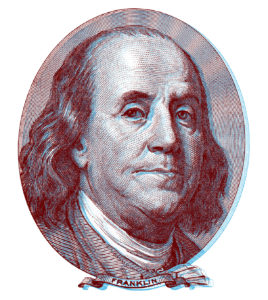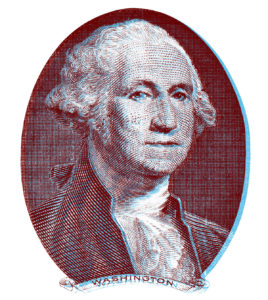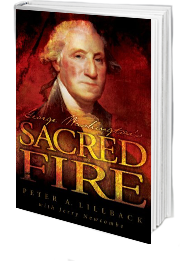The Constitution of the United States
 Benjamin Franklin
Benjamin Franklin
Benjamin Franklin is famous for lightning rods, stoves, spectacles, printing, politics and much, much more. Indeed, the eighty-one year old Franklin was the American patriarch at the time of the Constitutional Convention held at Independence Hall in Philadelphia in 1787. In a most remarkable way, he hallowed the Convention with his eloquent call for prayer.
Addressing the Convention presided over by none other than George Washington, he reminded the Convention of God’s sovereign providence on America’s behalf.
In the beginning of the Contest with Great Britain, when we were sensible of danger we had daily prayer in this room for the Divine protection – Our prayers, Sir, were heard, and they were graciously answered. All of us who were engaged in the struggle must have observed frequent instances of a superintending providence in our favor.
To that kind providence we owe this happy opportunity of consulting in peace on means of establishing our future national felicity. And have we now forgotten that powerful Friend? Or do we image we no longer need His assistance?
I have lived, Sir, a long time, and the longer I live, the more convincing proofs I see of this truth: that God governs in the affairs of man. And if a sparrow cannot fall to the ground without his notice is it probable that an empire can rise without His aid? We have been assured sir, in the Sacred Writings that ‘except the Lord build the house, they labour in vain that build it (Ps. 127:1).’ I firmly believe this, and I also believe that without His concurring aid we shall succeed in this political building no better than the builder of Babel. We shall be divided by our little partial local interests; our projects will be confounded and we ourselves shall become a reproach and bye word down to future ages. I therefore beg leave to move that, henceforth, prayers imploring the assistance of Heaven and its blessing on our deliberation be held in this assembly every morning. . .and that one or more of the clergy of this city be requested to officiate in that service.
 General Washington
General Washington
General Washington was selected to preside over the Constitutional Convention. He set the tone of the gathering soon after his arrival in Philadelphia:
If to please the people we offer what we ourselves disapprove, how can we afterwards defend our work? Let us raise a standard to which the wise and the honest can repair; the event is in the hands of God.
Looking back at the Constitutional Convention, from the vantage point of the following summer, Washington saw God’s intervention in the production of the American Constitution. On June 30th 1788, after the ratification of the Constitution, Washington wrote to Benjamin Lincoln:
No Country upon Earth ever had it more in its power to attain these blessings … Much to be regretted indeed would it be, were we to neglect the means and depart from the road which Providence has pointed us to, so plainly; I cannot believe it will ever come to pass. The Great Governor of the Universe has led us too long and too far … to forsake us in the midst of it. . . We may, now and then, get bewildered; but I hope and trust that there is good sense and virtue enough left to recover the right path.
Consider also, Washington’s letter to his good friend, Governor Jonathan Trumbull of Connecticut. General Washington wrote on July 20, 1788:
We may, with a kind of grateful and pious exultation, trace the finger of Providence through those dark and mysterious events, which first induced the States to appoint a general Convention and then led them one after another into an adoption of the system recommended by that general Convention; thereby in all human probability, laying a lasting foundation for tranquility and happiness.
In fact, Washington wrote to his dear French friend and fellow warrior Marquis de LaFayette calling the Constitution a “miracle.” James Madison also considered the Constitution to be the result of a miracle. In a letter to Jefferson he says, “It is impossible to consider the degree of concord which ultimately prevailed as less than a miracle.”
During the convention, Alexander Hamilton was summarized by Madison:
This was the critical moment for forming such a Government. We should run every risk in trusting to future amendments. As yet we retain the habits of union. We are weak & sensible of our weakness. Henceforward the motives will become feebler, and the difficulties greater. It is a miracle that we are now here exercising our tranquil & free deliberations on the subject. It would be madness to trust to future miracles. A thousand causes must obstruct a reproduction of them.
Our Constitution emphatically rejects all tests of religion for service in the offices of the federal government. But the authors of what DeToqueville called “the matchless Constitution” affirmed that a miracle of providence had enabled them to complete their work. They believed that our constitutional government and faith in God’s providential government were not contradictory.
Not every delegate was satisfied, but on March 4, 1789, the day which had been chosen to be the starting point of a new federal government, eleven states had ratified the Constitution. North Carolina and Rhode Island ratified it in November, 1789 and May 1790, respectively. The preamble of the Constitution highlights the quest for and value of the “Blessings of Liberty”:
We the People of the United States, in Order to form a more perfect Union, establish Justice, insure domestic Tranquility, provide for the common defence, promote the general Welfare, and secure the Blessings of Liberty to ourselves and our Posterity, do ordain and establish this Constitution for the United States of America.
To read the full text of the Constitution for the United States, click here. This depiction was originally found on www.constitutioncenter.org
